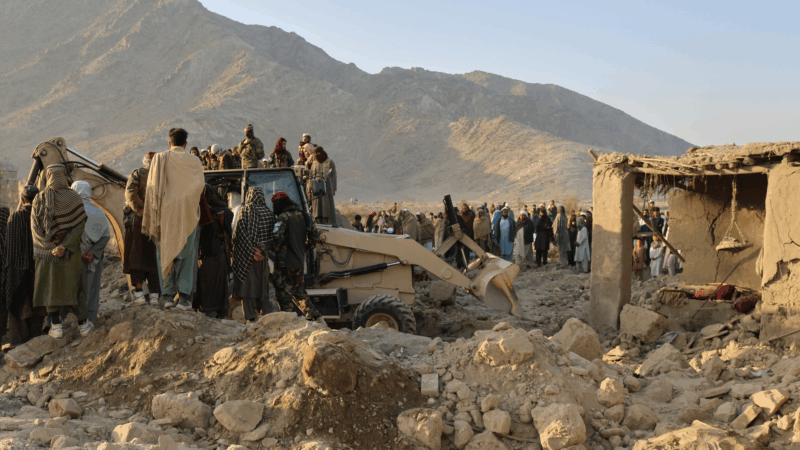His name is Mohammad Al-Motawaq. He is 18 months old. And he is starving in Gaza
GAZA CITY, Gaza Strip — In a tent by the Mediterranean Sea, Hidaya Al-Motawaq cradles her crying baby boy and tries to offer what comfort she can. “Khalas,” she murmurs repeatedly. “Khalas, khalas.” Enough, that’s enough.
Mohammad is a year and a half old and nearly all bone. His eyes protrude, as does his swollen stomach. His spine is so sharp and so defined, it seems it might poke through his thin skin.
Al-Motawaq, 30, says she no longer has breast milk to give him, because she herself is malnourished.

A widow, Al-Motawaq went from hospital to hospital, looking for food or milk to offer Mohammad and her other child, his five-year-old sister, but says she has been unable to find any. The one remaining pediatric ward treating malnutrition in Gaza closed down this month, citing a lack of food and medical supplies.
So she cradles Mohammad constantly, and strokes his thinning hair. What he needs is to eat, but all she has to give him is water. He is wasting away in front of her eyes.
This is just one family. Gaza has about 1 million children — about half the population. Doctors and aid workers warn chronic malnutrition is permanently damaging the health of children like Mohammad across the Gaza Strip.
“This war is targeting a generation, a generation of children who are below three years, because the central nervous system is nearly composed in [these] two, three years,” says Dr. Ahmed Al-Farrah, head of pediatrics at Nasser Hospital in southern Gaza.
The United Nations has warned the enclave is facing mass starvation as Israel has restricted how food and other humanitarian aid get into Gaza.
Facing mounting international pressure, Israel’s military on Sunday began a daily 10-hour pause in fighting in some of Gaza’s biggest population centers, to deliver more food and aid. Israel says it’s pausing military activity until further notice during these hours in Gaza City, Deir al-Balah and Al-Mawasi, the areas where Israel has ordered Palestinians to shelter. Israel says it’s also creating secure routes for United Nations aid trucks to distribute food and medicine across Gaza.
With the government under pressure from far-right parties to control food aid to Gaza, Israel also blames Hamas for stoking chaos around aid delivery and accuses it of benefiting from aid distribution.
U.N.-backed food security experts warned in May that one in five people in Gaza face starvation. Gaza health authorities say more than 130 people have died from causes it described as “famine and malnutrition” since the start of the war in Gaza in October 2023. On Sunday, they reported that six people died from these causes in the previous 24 hours alone.
Multiple conditions must be met for a formal declaration of famine, which has so far not been declared in Gaza according to the international mechanism established for measuring levels of hunger.
Doctors say the damage to children’s bodies in Gaza after months of hunger is already irreversible.
“We see increasing level of stunting,” says Dr. Mohammed Mansour, senior nutrition manager in Gaza with the International Rescue Committee.
One in three people are no longer eating for days at a time, warns the U.N.’s food program in Gaza. The United Nations says about 100,000 woman and children are severely malnourished in Gaza and need immediate medical care. The international organization Doctors Without Borders, known by its French acronym MSF, says 25% of the pregnant women and children ages six months to five years old whom it has been able to screen in Gaza are malnourished.
Even if Gaza’s severely malnourished children survive, Farrah from Nasser Hospital worries they will suffer from neurological impairments brought on by starvation. He rattles off a list of possible side effects from hunger in young children: “attention deficit hyperactivity disorder, difficulty in school performance, difficulty in comprehension, difficulty in speaking.”
“Things have gotten so far afield towards famine and really significant food insecurity that we may not even be able to turn this situation around if there were more aid going into Gaza, because it’s causing so much damage,” Kate Phillips-Barrasso, a vice president of Mercy Corps, told NPR’s All Things Considered last week.
Israel says it is letting in food through its own distribution program, implemented by the Gaza Humanitarian Foundation, a private group backed by the U.S. But that system has been deadly for Palestinians, with dozens of people last week alone killed by Israeli gunfire while trying to get food.
“Our people die for nothing,” says Saddam Abu Odai, 34.
The IRC’s Mansour says after 21 months of shifting Israeli restrictions on how much and what kind of food can enter Gaza, he is seeing a shortage of significant nutritional elements in children’s diets, such as iron, magnesium and calcium, because meat, vegetables and fruit are nearly impossible to obtain.
The vitamin and mineral deficiencies “impact the development of a child’s heart, liver and circulatory system,” he says.
He knows in clinical detail how children’s bodies are being destroyed by hunger, not only because he is a medical professional but also because he sees it happening to his own two children.
“Every night I ask myself whether I will see my children the next morning. I feel helpless and unable to protect them,” he said. “No eggs, meat, milk or fruit… we have not eaten them for six to seven months.”
Negotiations between Hamas and Israel for a potential 60-day ceasefire paused last week, sending Palestinians in Gaza into despair as more days went by without food.
“Every day costs us blood,” laments Dr. Tawfiq Abu Jarad, 44, who has been displaced to a tent in Gaza City. “We need [a ceasefire] now… I expect famine will reach my tent soon despite my best effort. In two weeks, we will die out of hunger.”
The negotiations have stalled on disagreements over issues including how much of a military presence Israel will keep in Gaza and the duration of the ceasefire.
“I care more about food and water. I do not care about the news. Half of our family are young children, and we think of them more,” says 20-year-old Salwa Shamali.
She is one of the older siblings in her family, whose days are dictated by a relentless schedule designed to find food and water for her younger brothers and sisters.
Their search begins at six in the morning, when they can sometimes find fresh water. At 2 p.m., her brothers try to get food from a local charity or school.
At 6 p.m., her father ventures out to a nearby market, but he usually comes back empty-handed.
Hidaya Al-Motawaq’s world — the tent by the Mediterranean Sea — is even smaller. But she still has her children — Mohammad and his sister. And she wants to keep them both alive.
Abu Bakr Bashir contributed to this story from Sheffield, England. Ahmed Abuhamda contributed from Cairo.
Pakistan claims to have killed at least 70 militants in strikes along Afghan border
Pakistan's military killed at least 70 militants in strikes along the border with Afghanistan early Sunday, the deputy interior minister said.
Team USA faces tough Canadian squad in Olympic gold medal hockey game
In the first Olympics with stars of the NHL competing in over a decade, a talent-packed Team USA faces a tough test against Canada.
PHOTOS: Your car has a lot to say about who you are
Photographer Martin Roemer visited 22 countries — from the U.S. to Senegal to India — to show how our identities are connected to our mode of transportation.
Looking for life purpose? Start with building social ties
Research shows that having a sense of purpose can lower stress levels and boost our mental health. Finding meaning may not have to be an ambitious project.
Sunday Puzzle: TransformeR
NPR's Ayesha Rascoe plays the puzzle with listener Joan Suits and Weekend Edition Puzzlemaster Will Shortz.
Danish military evacuates US submariner who needed urgent medical care off Greenland
Denmark's military says its arctic command forces evacuated a crew member of a U.S. submarine off the coast of Greenland for urgent medical treatment.






